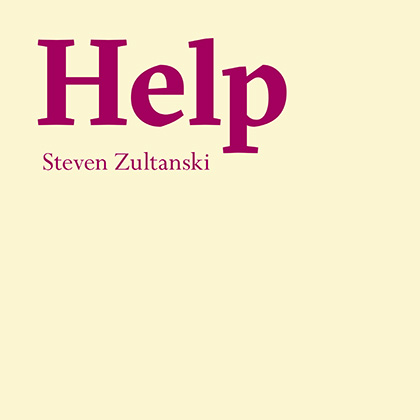Critical Inquiry Critical Inquiry
Steven Zultanski. Help. Durham, N.C.: Golias Books, 2024. 164 pp.
Review by Tan Lin
24 September 2025
In Help, Steven Zultanski explores the social embeddedness of the language of our feelings. The book’s four conversations are orchestrated as games, where the grown-up ritual of speaking language that is sometimes called “poetry” transpires as a scripted, edited social experiment in the management of what are sometimes called “feelings.” In its deliberate voiding of poetry’s high ground, the four staged acts or actions are provocations cued to the everyday and its population by minor, childlike, sometimes regressive affects. With an emotional register ranging from petulance to narcissistic neediness, the book dissects the field of the minor affects with discomfiting precision. The book is doubly expansive in this sense: What if poetry were more like a script in the making, or the end-stage documentation of an artworld performance?
In “Help,” four friends sit around a table “remembering sentences they used as children to protect their privacy” (p. 101). Across twenty-one scenes in “A Glass of Water,” one half of a couple asks the other if she’d like a glass of water. In “Breakfast’s Ready,” six friends talk about “the deaths of people they didn’t know very well” (p. 3). In “Breakfast,” the order is unscripted; conversations unfurl and peter out as expected. Breakfast is served inter alia. Speakers are not identified as they would be in a script. Each speaker addresses the group in the first person. Before speaking, each picks up a spatula and throws it to the floor. Housekeeping matters are subject to obvious hilarity (“They know how to collect dishware and bring it to the sink. They know how to hold their fingers under running water until it gets hot” [p. 33].)
The rhetorical flourish with an everyday, slightly ridiculous kitchen implement signals the beginning of a scene in which friends are turned into actors by the comedic action of a spatula. Darkness outside the kitchen window amplifies the grogginess within, miming that slow-motion coming to consciousness of not being fully awake in someone else’s apartment. The narrator remarks: It’s “very early” (p. 3). When will the proceedings end? When no more spatulas, plastic or metal, can be thrown.
Two paragraphs in, after setting and players are introduced, the reader is a player in the reenactment, attending the workmanlike proceedings as if reading a play, prompted by the feeling of being a witness to something. This witnessing is indirect—the witnessing of someone else’s witnessing—and attenuated by repetition and the ordinariness of feelings that are relational, context-dependent, and staged within social settings. This theatricality, voyeuristic and interiorized, displaced and parenthetical, is linked to the feelings and an emergent mode of consciousness. The reader’s participation feels like a suppression folding in on itself. A tender awkwardness ensues—as if the everyday had been staged within the idea of the everyday. One lovely moment occurs when a speaker’s story is preempted politely:
“I’ll . . . talk about my second cousin, Leah. We were close when we were kids but I don’t really keep in touch with her now. She had a daughter who was born with a brain or heart condition—
Heart condition.
(Faucet running. Sound of dishes being scrubbed, dried, put away. Cabinet doors opening and closing.)
Yeah, a heart condition. And she went through a surgery that didn’t go quite right—
I don’t know if—
What?
It’s just that I don’t know if you should tell this story.”
[pp. 33–34]
The feeling of being trapped in a social situation where one doesn’t quite know what to say—like being trapped in one’s own feelings—is endemic to anyone familiar with Emilé Durkheim. People ponder others’ deaths all the time, partly out of curiosity of what cannot be known, partly to prevent such unaccountable deaths from occurring to them. Many of the recounted deaths are suicides.
Zultanski foregrounds the transcription as a staged witnessing. An unnamed narrator/host interacts and records conversations and presumably edits and embellishes them. The narrator also provides breakfast and shelter. The authorship is never not personal and the verb to author is used in the broadest sense. Because remembrances center on people the speakers don’t know well, rules of etiquette offset strong individual feelings about the deceased. The transcription by an (unnamed) narrator combined with unspoken rules of etiquette lend the text’s utterances an anonymous patina, less a series of soliloquies than a mildly affective social encounter auto-scripting itself or the annoying voice of a child played ad nauseam. Every feeling’s a feint—or a stage prop.
By book’s end, an unsettling feedback system emerges, an ideological apparatus foregrounding the hard-to-read nature of the feelings and the individuals having them but also the lovely, flattened intimacy of close friends, whose understanding does not require any overworked language to make itself felt. This feeling apparatus is smartly, sometimes hilariously probed across a familiar if not-quite-familial spectrum: friends, lovers, friends of friends, children.
The everyday linguistic world we inhabit may be proscribed and increasingly scripted (spatulated?) by social media; it has game-like conceits. The demographic in Help skews mid-youngish, the setting Covid/post-Covid, though the internal historical dating is not explicit. In place of a spontaneous overflow of emotions, the book serves up recollection as offhand transcription and ex post facto editing. But the reader is also privy to spaces and feelings not always given their due: that peculiar species of feeling that’s not quite a feeling, in other words, feelings we feel we ought to be feeling more strongly—but aren’t. And this condition, like its emptying out, may be a more accurate description of our terms of involvement with the world, needy partners, whiny children and all.

